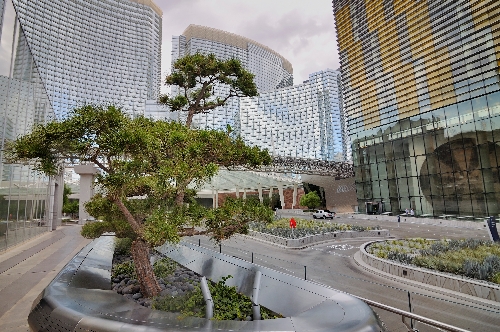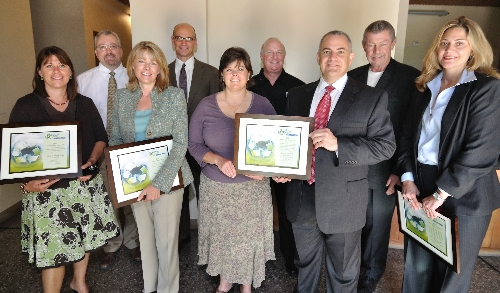Southern Nevada businesses pursue eco-friendly cost-savings measures


Green, the catchall eco-conscious term, increasingly means greenbacks for businesses. Companies are eagerly climbing aboard the sustainability bandwagon, as record unemployment, sluggish job growth and frozen credit markets sap business. Yet, hope remains high for a green economy based on environmental lifestyle products and practices that focus on reducing waste and conserving natural resources. Green building is already a mainstream part of architectural design and construction.
“The green-building market has basically tripled for the last two years, which is a good sign that it’s flourishing,” said Rick Van Diepen, 2010 president of the Nevada chapter of the U.S. Green Building Council. “Developers and owners are seeing the value in green building as a competitive differentiator. The bottom-line decisions are becoming paramount in terms of lowering operating costs.”
U.S. buildings generate 39 percent of carbon-dioxide emissions, consume 40 percent of energy and use 13 percent of all water each year, the council reports. Innovation and improved efficiency can dramatically improve energy consumption and conservation. Green buildings, on average, use 40 percent less water and 30 percent less energy, the council said. They also reduce carbon emissions and solid waste by 35 percent and 70 percent, respectively. It’s a bottom-line cost savings that is rapidly attracting acolytes.
“The recession affects the pace of private development,” Newland Communities Senior Vice President Rita Brandin said. “But it has been demonstrated in a competitive market that tenants look for best performance of buildings. High-performance energy-efficient buildings tend to maintain higher occupancy levels and rents than other properties, as a result.”
Recession-racked property owners looking to lower overhead and gain a competitive edge are turning to green retrofits of existing buildings to reduce energy bills. Green building retrofits are expected to increase by as much as 30 percent by 2014, reaching $15 billion in annual construction spending, McGraw-Hill Construction reports.
“Green growth is phenomenal across the globe,” McGraw-Hill Construction Vice President Harvey Bernstein said. “The expansion of green products and services will have a long-term impact on our future economy and ability to build green.”
A green mindset has increased recycling efforts, which both conserves and earns money. AAEQ Manufacturers and Recyclers, for example, pays top dollar for scrap metal, including car engines and transmissions. The Las Vegas-based company operates a full-service scrap-metal recycling facility that hauls away unwanted stuff.
Republic Services recently increased its recycling capabilities to meet growing customer demand. The company announced plans for a $25 million, 50,000-square-foot expansion earlier this year and bought Evergreen Recycling, a 13-year-old Las Vegas-based company that sorts and separates recyclable materials for reuse elsewhere.
Beyond hard-dollar cost savings and feel-good benefits, green practices like recycling and green building also send a public message of community caring and environmental responsibility. Sustainable offices also have an easier time recruiting and retaining employees — well-lit, properly ventilated, healthy work settings reduce recidivism and increase employee productivity, studies show.
Contact reporter Tony Illia at tonyillia@aol.com
or 702-303-5699.












